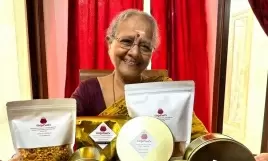A boatman who does not charge for his last trip

24-December-2010
Vol 0 | Issue 1
It’s just that the winter sunshine of the new political economy of the sexy sensex somehow always misses the margins, the edgy thresholds, the glazed eyes sparkling with hope, the impossibility turned into a rainbow of possibilities, the helplessness turned into resilience, the optimism within the despair, the whistle in the dark becoming a twinkling star which shows the way.
What these edgy small is beautiful thresholds are looking for is basically the essence within the materialism, the soul within the flesh. And that is how this spreads, becomes both magic and realism, Satyajit Ray’s song of the road, the eternal journey of hope, doing, giving, sharing, against the fatality and inevitability of defeat or success. This is something the policy makers of wealth creation and 9 per cent growth completely miss out, including the microscopic section of just about 3 per cent of the Indian population which ritualistically celebrates the sensex and the stock market.
Think about it, they might be pushing them out from the mainstreams and margins of Delhi, before and after the Commonwealth Games, but food is a underground business which is not only the monopoly of big business or intercontinental eternally freebie food critics. This is because these are typical epical narratives of history from below as if written by Fyodor Dostoevsky looking for the white nights of sparkling St Petersberg in hungry Tsarist Russia.
Only in East Delhi’s inner lane can you find this obscure hot dog seller. Two buns, fried in clean oil, one cheese piece folded between the two buns, plus two tomato and onion peels, a little chilli, one fried potato tikka, green coriander chutney, red sauce, salt masala, neatly folded in a paper plate with a tissue paper along. One hot dog for Rs 5. After the recession, it hit the Rs 6 mark. I ask for an extra potato tikka. He refuses to take a pie more. “This is enough,” he says.
Check out that simple folk in a clean shirt and a pyjama, in a quiet corner away from the gaze of the parasitic police, selling baked chana (gram) in a dekchi with two kulchas (bread), pickles, onions, coriander leaves, black salt masala and lemon thrown in. All home- made, perhaps by a modest woman in a small kitchen in an open fire in a mud hut with the smell of cow dung and tulsi flowers in the little open-to-sky courtyard nearby. It opens the pores of your brain cells, it feeds your intestines, it makes you all too human once again as you share your meal with rickshaw pullers, students and young executives, under the shadow of a tree. You can even ask for extra chillies and little bit bigger squeeze of the lemon. No problems. It arrives with a smile, of humility and giving. And all for ten bucks.
This is ground zero realism, independent social enterprise without frills, no dirty bail-outs, backroom deals or subsidies. Food from, by, of the people
Check out Sunilda. Perhaps the only Bengali entrepreneur outside the bhadralok country in the Hindi heartland who does not take a siesta after a heavy fish curry-rice lunch. He ran a tiny food joint in Mayur Vihar beyond the Yamuna in Delhi, from within a slum, where he lived with his wife. He made perhaps the best dry chicken and mutton (kosha) in the whole of Delhi, plus fish curry, vegetable, fish and egg chops, and rolls of all kinds. All the bachelors and working girls in this densely populated area of professionals would hit his roadside joint for food every day, or order on his landline. He would have a separate Rs 10 meal for the working poor, while it was dirt cheap for us journalists. He was happy and hardworking. And he sent his little daughters to a English medium school. He had high hopes for them.
One day, they came and demolished his shop cum home. He was rendered homeless, jobless, hopeless. After two years of struggle in this new growth index, refusing to be crushed, he started a handcart in a nearby market after paying the cops a heavy bribe. They still come and try to destroy his shop, but his fans keep arriving, so do the poor pros, even as he laughs heartily: “Don’t pay if you don’t have money. Money will vanish into thin air.”
It does. But not the resilience and magnanimity of these great Indians on the margins. All of them: my Indians of the Year.
Footnote: I once met a boatman on river Sutlej in the submerged town of Bilaspur in Himachal Pradesh. The old town had gone under water after the Bhakra Nangal dam was built. It was his last trip on the jam-packed boat from one shore to another. Last stop. People jumped out without paying a dime. I asked: Why?
He said, “I have made enough for the day. People are returning home after a tired day. This is my tribute to them. This last trip is free.”
Amit Sengupta is Executive Editor of Hard New















